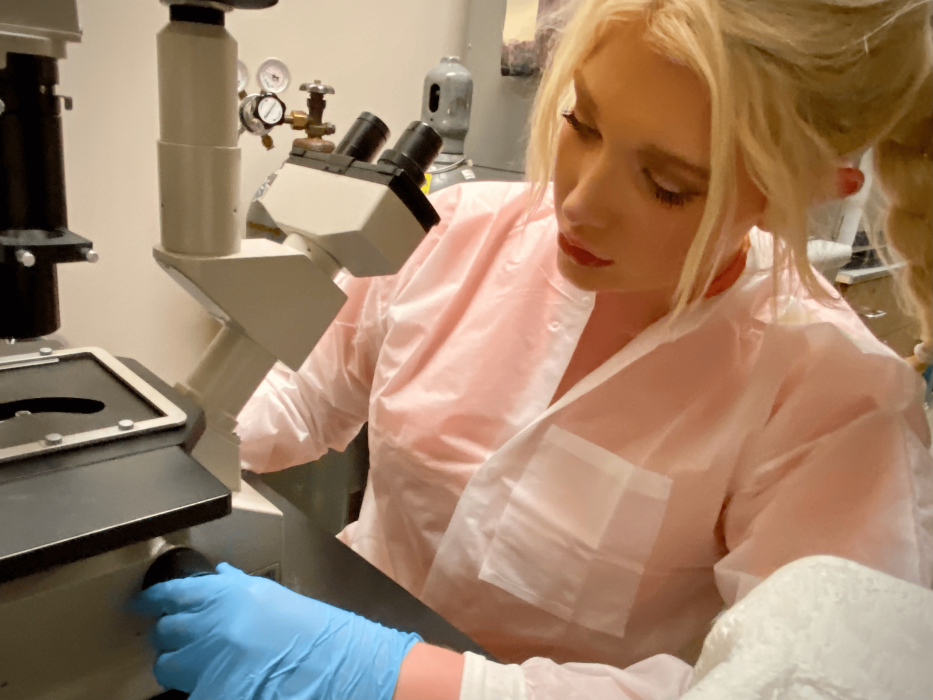SOAR Student Profiles

Michaela Harrison
- SOAR Position: Member; Research Ambassador, Peer Mentor (2024-2025)
- Major: Biology with a Minor in Neuroscience
- Faculty Mentor(s): Dr. Jamie Burriss
Current Focus: MT Microbiology Research Lab
Project Description
As a research assistant, I provide independent scientific analysis and application of laboratory techniques to several different research projects that my professor assigns to me. In the MT Microbiology research lab I am learning how to perform vital microbial lab techniques and their functions. Some of these skills include but are not limited to; conducting routine and complex laboratory tasks, collect lab data and analyze the results, perform analyses such as bacteriology and virology, perform routine quality control duties, conduct microbial tests, including plate counts, coliform counts, E. Coli counts following all current laboratory standards and perform laboratory analysis of environmental samples, including using standard microbiological techniques and skills.Why does this topic interest you?
Microbiology plays an important role in disease prevention and disease control. The majority of the natural elements on the earth contain microorganisms, many are beneficial for humans and the environment but there are microbes that are harmful to our health and environment. My primary research focus has been directed towards bacteria “Staphylococcus Aureus”, a gram-positive bacteria that causes a wide variety of clinical diseases. With the drastic increase in antibiotic resistance in Staphyloccus Aureus, healthcare professionals and providers are recognizing the need for a clinical approach and treatment plans other than the use of antibiotics. In my research lab, I am spending time learning valuable microbial techniques, skills, and functions.What are your professional aspirations?
To be a professional of biology there are several core characteristics that one must have, as well as various different requirements that must be met. Professors of biology typically have a doctorate degree and prior experience teaching in a collegiate setting is often preferred at most universities. Biology is an investigative occupation that requires strong proficiency in Chemistry and Mathematics, as well as proficiency in a variety of social sciences and liberal arts courses. At MTSU I have served as a student mentor and a research ambassador. I have worked in two different research labs as an undergraduate research assistant. My first research experience was in the MT Cognitive Aging Laboratory. My current research position is in the Microbiology lab with Dr. Farone. I am actively seeking graduate school programs that offer the opportunity to work as a TA (teacher’s assistant). I have completed all general education courses offered at MTSU as well as all required courses for my neuroscience minor. I have an expected 32 credit hours left to complete before graduation. I intend on maintaining my position as an active undergraduate student research assistant and student mentor. I have been prioritizing strengthening the professional connections that I have made with on-campus professionals by conducting interviews and actively visiting their office hours to check in on them and update them in regards to what all I have going on in school. I have been seeking out external opportunities and scholarships that exist that I qualify for. I was granted a position in the TAPDINTO-STEM program that is nationally funded by the National Science Foundation that encouraged me to introduce myself to various different professors and professionals on campus. During my time in this program I conducted several interviews with professors in the chosen field that I am pursuing. This on-campus participation enhanced my academic and social practices.Do you have any advice for future researchers?
Undergraduate research is useful because it increases the active engagement of students in the science, technology, engineering, and mathematics disciplines. It provides rich and valuable insight and experience about what it is like for you to work inside of a research lab, conduct clinical studies, analyze crucial clinical data as well as various other tasks that will be assigned to you. The first thing I recommend when seeking out opportunities is to begin looking for professors that have active research studies going on and are actively seeking to recruit a team of students to work with them. Start by briefly reading the previous projects and studies that the professor has conducted and learn all of the details that you can about their lab. Once you have chosen a few professors, reach out and express your interest in meeting with them to discuss their research. During the initial meeting, you can begin to make personal connections to your academic studies and their lab while also understanding the details about their lab. By discovering the personal connection between yourself and the research field that interests you the most you will begin to truly value the enrichment that the opportunity will provide you in your academic developments and professional career.


